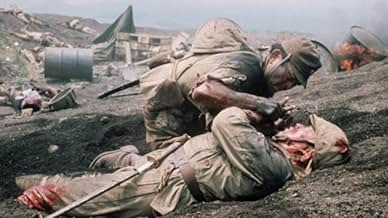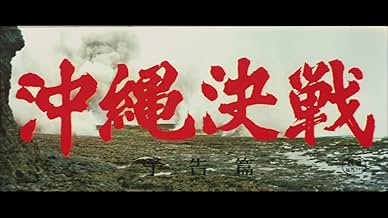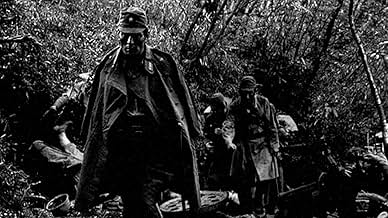Agrega una trama en tu idiomaTold from the Japanese perspective, this war drama captures the events of World War II's Battle of Okinawa - a massive amphibious assault by U.S. troops that left more than 150,000 Japanese ... Leer todoTold from the Japanese perspective, this war drama captures the events of World War II's Battle of Okinawa - a massive amphibious assault by U.S. troops that left more than 150,000 Japanese civilians dead.Told from the Japanese perspective, this war drama captures the events of World War II's Battle of Okinawa - a massive amphibious assault by U.S. troops that left more than 150,000 Japanese civilians dead.
- Dirección
- Guionistas
- Elenco
- Dirección
- Guionistas
- Todo el elenco y el equipo
- Producción, taquilla y más en IMDbPro
Opiniones destacadas
The film is pretty bad across the board. Even ignoring the poor special effects due to budget, the direction and editing is poor. A tighter script and decent editing would have done wonders for what could have been a good film. The story line is grim, of course, but is badly handled and is an emotionless tale of waste. To get an emotional response from an audience you need to care about the characters, and that empathy is what the movie truly lacks. The film is a docudrama, but lacks drama and the power of a documentary. It's worth a look, but is certainly not a good film. Compare BoO with Story of a Prostitute, Fires on the Plain, or The Burmese Harp, and you'll understand why it is a forgotten film.
Battle of Okinawa is a film directed by the now legendary Kihachi Okamoto. It stars Tatsuya Nakadai and Tetsuro "I'm in every Japanese film" Tamba. Both show off their acting chops in this film and deliver outstanding performances. Don't get me wrong though, there are dozens of actors in this film with almost equal scream time as these two men. This is definitely an ensemble piece on one of the most gruesome slaughters on the Japanese armies front. This film is not easy to watch. It is much more violent than "Letters From Iwo Jima" and as in "Iwo" we see how fanatical the Japanese army was at this point in history. Being taken prisoner was not an option and losing meant death or forever living in dishonor. This notion is even implemented to civilians who in this move kill themselves in droves. Tatsuya Nakadai's character is one of the few characters who believes that suicide in not the only option in defeat. He is the western voice in the film for his character even studied in America. This is a hard core war film that takes no prisoners. I recommend you go out and buy this film for it is now available in R1 DVD thanks to the fine folks at AnimEigo.
Little known but impressively detailed and completely uncompromising depiction of the battle of Okinawa from the Japanese perspective. I think it deserves a rerelease or more exposure, because as an antiwar film, it's very impressive, and even ahead of its time.
American war films were still a fair way off from showing war in a truly hellish manner at this point in film history- there's a real misery in this one that prevents any battle scenes from being fun or exciting to watch, even if there is a degree of spectacle due to the relatively high budget.
That sense of doom and inevitable loss, coupled with the savage violence that pulls absolutely no punches (it's comparable to Saving Private Ryan, yet came out over 1/4 of a century earlier) makes it a tough but engaging watch, and it mostly earns its lengthy runtime of 2.5 hours.
And of course, a war film like this shouldn't pull punches. It's generally far better to show war on film as ugly rather than exciting, especially a conflict like the one on Okinawa.
Characters are simple but serviceable, and despite the limited character development, you can feel some sympathy for them as individuals stuck in a conflict, whilst still feeling angry at the whole institution of war itself. The way it occasionally checked in on how civilians were coping was particularly powerful and unique, too.
American war films were still a fair way off from showing war in a truly hellish manner at this point in film history- there's a real misery in this one that prevents any battle scenes from being fun or exciting to watch, even if there is a degree of spectacle due to the relatively high budget.
That sense of doom and inevitable loss, coupled with the savage violence that pulls absolutely no punches (it's comparable to Saving Private Ryan, yet came out over 1/4 of a century earlier) makes it a tough but engaging watch, and it mostly earns its lengthy runtime of 2.5 hours.
And of course, a war film like this shouldn't pull punches. It's generally far better to show war on film as ugly rather than exciting, especially a conflict like the one on Okinawa.
Characters are simple but serviceable, and despite the limited character development, you can feel some sympathy for them as individuals stuck in a conflict, whilst still feeling angry at the whole institution of war itself. The way it occasionally checked in on how civilians were coping was particularly powerful and unique, too.
This is an exhaustive (and exhausting) account of events surrounding the Battle of Okinawa, beginning with pre-invasion defense preparations (starting in July 1944), then moving to the aerial bombardment, to the US invasion, and finally to ground combat. In its desire to be "complete" and thoroughly document the battle (from the Japanese POV, of course), it shortchanges story and characters. It feels like three hundred mini-vignettes rapidly spat out by a machine gun rather than a smoothly flowing, cohesive whole.
As for historical context and accuracy, others have already pointed out their reservations about the Japanese being framed as noble, even heroic, warriors fighting the good fight against overwhelming odds. This complaint about its narrative framing also applies to virtually every Japanese film about World War II. In the collective cinematic imagination of Japanese WWII films, the "war" is treated almost as a cosmic, non-human, event that simply happens TO them. Unlike in many German films where characters ponder "will the world forgive us?" or "now our chickens are coming home to roost. We will now reap what we have sown", in Japanese films, it is almost always "oh poor us. We are losing. It's so sad. Why must we lose? What about our honor? What about our children?"
As for historical context and accuracy, others have already pointed out their reservations about the Japanese being framed as noble, even heroic, warriors fighting the good fight against overwhelming odds. This complaint about its narrative framing also applies to virtually every Japanese film about World War II. In the collective cinematic imagination of Japanese WWII films, the "war" is treated almost as a cosmic, non-human, event that simply happens TO them. Unlike in many German films where characters ponder "will the world forgive us?" or "now our chickens are coming home to roost. We will now reap what we have sown", in Japanese films, it is almost always "oh poor us. We are losing. It's so sad. Why must we lose? What about our honor? What about our children?"
Chronicling the bloodiest and most pointless last stand of the Pacific Theatre, The Battle of Okinawa is far more well-known nowadays for essentially giving Hideaki Anno his career. Told in a quasi-documentary-like format, with black and white newsreel footage juxtaposed with narration from Kiyoshi Kobayashi over the dramatic scenes, Kihachi Okamoto manages to expertly balance horrific authenticity with few artistic liberties taken along the way. It's a film that captures an essence of bravery, lunacy and hollow childlike subservience, as well as the sheer devastating horror that gets increasingly desperate and progressively violent the longer it goes on, the final 5-minutes alone comparable to the likes of Saving Private Ryan in its entirety; Okamoto pulls no punches in the graphic details with his cynical, dark sense of humour coming out in full force. With incredible performance from its cast, most notably Tetsuro Tanba and Tatsuya Nakadai, a fantastic if limited score by Masaru Sato and energetic direction, The Battle of Okinawa is an incredible epic, one of exhaustive and continual bombardment that takes no prisoners leaving the camera smeared with blood by its dramatic end.
¿Sabías que…?
- TriviaDirector Hideaki Anno has mentioned that this is the film he has watched the most in his life, well over 100 times.
- ConexionesReferenced in Caméra d'Afrique (1983)
Selecciones populares
Inicia sesión para calificar y agrega a la lista de videos para obtener recomendaciones personalizadas
- How long is Battle of Okinawa?Con tecnología de Alexa
Detalles
- Fecha de lanzamiento
- País de origen
- Idioma
- También se conoce como
- Battle of Okinawa
- Productora
- Ver más créditos de la compañía en IMDbPro
- Tiempo de ejecución2 horas 29 minutos
- Color
- Mezcla de sonido
- Relación de aspecto
- 2.40 : 1
Contribuir a esta página
Sugiere una edición o agrega el contenido que falta

Principales brechas de datos
By what name was Gekidô no Shôwa-shi: Okinawa kessen (1971) officially released in India in English?
Responda































